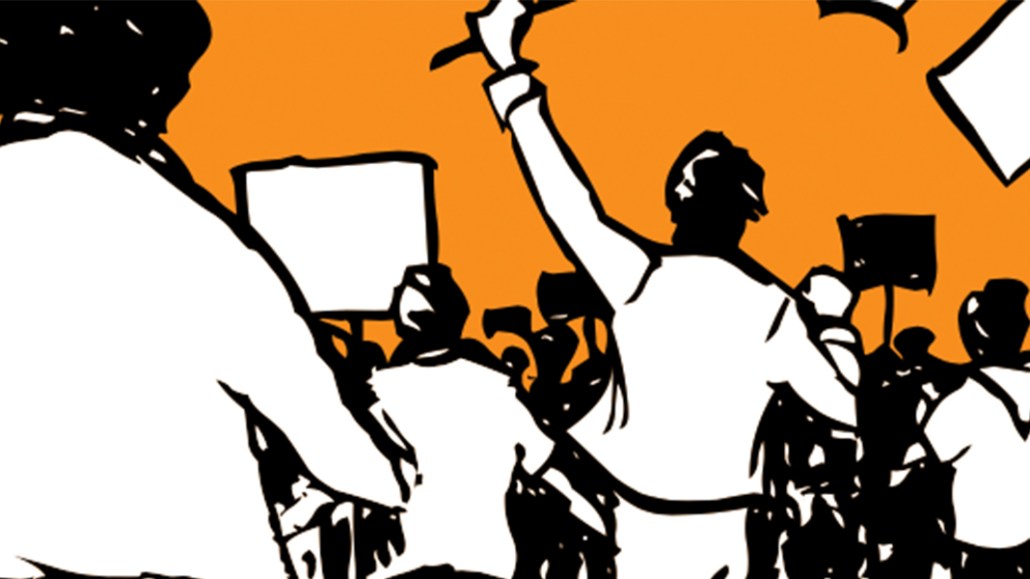Save 50% on a 3-month Digiday+ membership. Ends Dec 5.
‘Being off the platform speaks to our commitment’: And The North Face’s ad boycott won’t stop at Facebook

After pulling ads from Facebook over its failure to counteract the spread of hate speech, The North Face has other media owners in its sights.
Marketers at the outdoor retailer have been told not to buy paid advertising or post organic content to Facebook in the U.S. until the end of July when its boycott will be reassessed. This stance also applies to the Facebook-owned Instagram social network in the U.S., though The North Face marketers will continue to post organic content there. Its marketers in Canada, Germany, France, Switzerland, New Zealand and Australia have yet to be asked to make the same move.
“The focus is really on Facebook in the U.S. for now,” said the company’s vp of marketing Steve Lesnard.
There are six civil rights groups in the U.S. urging advertisers to stop buying ads on Facebook in order to push the business to curb hate speech and misinformation on its far-reaching platform.
The boycott of Facebook leaves The North Face without one of its largest media channels at a time when many advertisers are starting to ramp up marketing spend in order to capitalize on coronavirus-induced lockdowns being eased worldwide. A decision on how to redistribute those Facebook ad dollars is yet to be made by Lesnard and his team.
“Facebook is the second-largest media partner in our space,” said Lesnard. “It’s a significant media partner of ours. Being off the platform speaks to our commitment to see progress.”
And The North Face’s boycott won’t stop at Facebook. After all, the advertiser may not be funding hate speech on Facebook now, but there’s a strong chance it could be inadvertently doing so elsewhere. Indeed hate speech and misinformation plague YouTube as well as the long tail of smaller sites on which many advertisers frequently buy ads. Consequently, The North Face is reviewing all media owners it buys ads from, said Lesnard. The same goes for how it buys programmatic ads given there are disinformation sites exploiting opacity in ad tech to capture ad dollars, he said.
Ad position: web_incontent_pos1
“It’s an issue we’re taking a close look at,” said Lesnard. “Right now the aim is to focus our efforts on Facebook because its the biggest media platform and so will raise awareness. Hopefully, that will change any inaction from other platforms. The catalyst is the current conversation around Facebook that was started by the National Association for the Advancement of Colored People supported by us.”
Like many corporate responses to the Black Lives Matter protests sweeping acrosss the U.S., The North Face’s decision not to fund hate speech hinges on commitment and accountability. It’s why Lesnard is prepared to keep money away from Facebook if he isn’t satisfied with its response at the end of July.
“We will wait to see whether the commitment is there from Facebook,” said Lesnard. “If it isn’t then we’ll revaluate our strategy at the end of next month.”
In an emailed statement Facebook’s vp of global business group Carolyn Everson said: “We deeply respect any brand’s decision, and remain focused on the important work of removing hate speech and providing critical voting information. Our conversations with marketers and civil rights organizations are about how, together, we can be a force for good.”
For its part, Facebook removed nearly 10 million posts for violating its rules against hate speech in the last quarter, and most were caught before users spotted them.
Ad position: web_incontent_pos2
Advertisers want to see more drastic action to curb hate speech and misinformation on the platform, though they have stopped short of saying exactly what.
“We want to see immediate changes from Facebook, but we also want to see real commitment,” said Lesnard. “The stakes are too high as the communities are too big on Facebook so we need to drive for immediate change on the platform.”
Other advertisers are taking similar stances.
Patagonia, Recreational Equipment Inc and Ben & Jerry’s are also refusing to buy ads on Facebook during July, while agencies like Dentsu’s 360i and We Are Social are advising clients to do the same.
It’s not the first time advertisers have boycotted Facebook, but none of those moves brought about any lasting change because they were focused on business imperatives like ad targeting and measurement. But now, with advertisers fighting against systemic social ills like racism and inequality in the U.S., this time the outcome could be different.
Still, taking a strong social stance against social injustice is not without some risk for brand marketers.
“When a firm puts something out about being anti-racist then automatically they’re going to be scrutinized for their past behavior,” said Christie Nordhielm, associate teaching professor of marketing at Georgetown University. “If that behavior doesn’t match up with what they’re saying now and they don’t acknowledge that then they’re going to be in worse trouble than if they had said nothing at all.”
More in Media

What publishers are wishing for this holiday season: End AI scraping and determine AI-powered audience value
Publishers want a fair, structured, regulated AI environment and they also want to define what the next decade of audience metrics looks like.

Digiday+ Research Subscription Index 2025: Subscription strategies from Bloomberg, The New York Times, Vox and others
Digiday’s third annual Subscription Index examines and measures publishers’ subscription strategies to identify common approaches and key tactics among Bloomberg, The New York Times, Vox and others.

From lawsuits to lobbying: How publishers are fighting AI
We may be closing out 2025, but publishers aren’t retreating from the battle of AI search — some are escalating it, and they expect the fight to stretch deep into 2026.
Ad position: web_bfu



